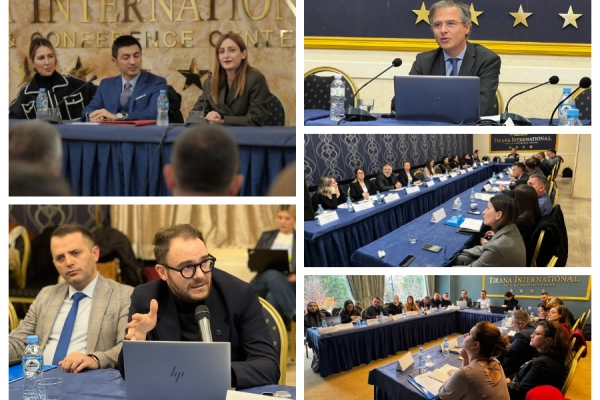
Executive Training on Building the Common Regional Market Strengthens Integration Efforts in the Western Balkans
2–5 December, 2024, Tirana, Albania
ReSPA, Regional Cooperation Council (RCC) and Albanian Centre for International Trade (ACIT) gathered policymakers, experts, and stakeholders to discuss and advance the CRM agenda, a pivotal initiative to foster economic integration and collaboration among Western Balkan economies.
The opening session featured speeches by distinguished leaders, including Majlinda Bregu, Secretary General of the Regional Cooperation Council (RCC), and Endrit Yzeiraj, Deputy Minister of Foreign Affairs of Albania. Director Handjiska Trendafilova emphasized the critical role of CRM in bolstering regional resilience and paving the way for EU integration.
A panel moderated by Blerjana Bino, Director of SciDev, brought together prominent experts to examine the CRM’s foundational aspects. The session highlighted the collective knowledge and forward-thinking perspectives of Elda Kalaja, Head of Office of the RCC Secretary General, who outlined the CRM’s strategic importance for regional exchange and growth, Prof. Milica Uvalić, European University Institute, Florence, who offered a comprehensive analysis of the economic and policy challenges in aligning with European standards; Prof. Will Bartlett, London School of Economics, who shared insights on regional economic dynamics and the role of CRM in addressing disparities; Klodjan Seferaj, Open Society Foundations, Western Balkans, who discussed the implications of social policies in fostering inclusivity and Odeta Barbullushi, Profesor at College of Europe, Tirana. Their combined expertise shed light on the opportunities and obstacles in building a cohesive regional market, sparking engaging discussions among participants.
Throughout the training, several thematic sessions provided participants with an in-depth understanding of the CRM’s components:
CRMI Phase - Achievements and Lessons Learned: Delivered by Pranvera Kastrati (RCC) and Zdravko Ilic (CEFTA), this session reviewed CRM Phase I, outlining successes and challenges.
EU Internal Market and Western Balkans Integration: Bernard Brunet, a senior expert and former DG NEAR official, offered detailed insights into how CRM aligns with EU internal market policies, emphasizing the transformative potential for the region. Mr Brunet also delved into policy framework, implementation strategies and measures for policymakers to harmonize standards and regulations within the free movement of goods under the CRM, while Mr Adam Lazowski, Professor at Westminster University elaborated on the free movement of services and Ms Odeta Barbullushi shed light on the free movement of people under the CRM
Valeska Esch, Senior Advisor to the German Federal Government, presented a compelling analysis of regional cooperation under the Berlin Process. Her insights highlighted how regional initiatives, such as the CRM, could serve as catalysts for enhanced cooperation and integration within the broader European framework.
In her focused sessions, Prof. Odeta Barbullushi addressed critical issues like brain drain and migration, proposing strategies to retain talent and foster human capital growth as an essential component of regional competitiveness.
Interactive elements were integral to the training, with a focus on practical applications and collaborative problem-solving:
Effective Communication for Regional Collaboration: Jakov Bojovic, European University Institute, conducted a workshop on leveraging communication tools to overcome regional integration challenges.
The final day explored the digital transformation agenda under the CRM, elaborated by Erjon Curraj, Senior Digital Transformation Expert in Albanian E-Commerce Association, emphasizing its role in enhancing CRM implementation. Participants left with a clearer understanding of how digital advancements could revolutionize regional markets.
The training concluded with a reaffirmation of CRM's importance as a unifying framework to accelerate the Western Balkans' European integration. With experts and policymakers collaborating closely, this executive training marked a significant step toward a cohesive, competitive, and innovative regional market.
This event not only equipped participants with knowledge and tools but also fostered a spirit of cooperation, essential for tackling shared challenges and unlocking the region’s potential.



